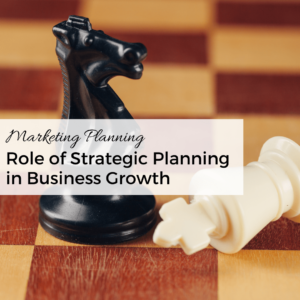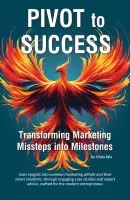In the dynamic world of business, growth is not just a goal; it’s a necessity. For entrepreneurs and business owners, understanding the pivotal role of strategic planning in business growth is crucial. This article delves into how strategic planning serves as the backbone of sustainable growth, especially for businesses transitioning from small operations to larger, more structured entities.
Understanding Strategic Planning in Business
Strategic planning is often misunderstood as a complex, corporate jargon-filled process. However, it’s essentially about setting goals and determining the best path to achieve them. This section will break down the concept, making it accessible and actionable for business owners.
The Essence of Strategic Planning
Defining strategic planning in the context of small to medium-sized businesses is crucial. It’s about envisioning your future and mapping out the steps to get there. This isn’t just for large corporations; even solo entrepreneurs need a clear direction to thrive.
The difference between strategic planning and day-to-day business planning lies in scope and vision. While daily tasks keep your business running, strategic planning focuses on long-term goals and how to achieve them. It’s about stepping back and looking at the bigger picture.
Why is strategic planning crucial for business growth? It aligns your daily activities with your ultimate business goals. It’s not just about working hard but working smart, ensuring every effort contributes to your growth.
Components of a Strong Strategic Plan
A strong strategic plan starts with clear vision and mission statements. These are not just formalities but the guiding stars of your business journey. They define what you stand for and where you aspire to go, providing a clear direction for all your efforts.
Setting achievable and measurable goals is the next step. These goals should challenge you but also be realistic, ensuring you can track your progress and stay motivated.
The importance of a thorough market analysis cannot be overstated. Understanding your market, competitors, and customers helps tailor your strategies to meet real needs and stand out in the marketplace.
Implementing the Plan
Turning plans into action is where many entrepreneurs stumble. It requires strong leadership to translate vision into reality. This means not just directing your team but also staying adaptable to change and responsive to new opportunities.
Monitoring progress and adapting strategies is vital. The business world is dynamic, and your plan should be too. Regular reviews and adjustments keep you on track towards your goals.
Employee engagement in strategic planning can be a game-changer, especially for small businesses. When your team understands and buys into your vision, they become powerful allies in your growth journey.
Strategic Planning and Business Growth
This section explores how strategic planning directly influences business growth, with real-world examples and actionable insights.
Scaling Your Business with a Plan
Strategic planning plays a crucial role in scaling operations. It’s about identifying growth opportunities and preparing your business to seize them effectively.
Case studies of successful scaling through strategic planning often highlight the importance of foresight and preparation. Businesses that anticipate market changes and adapt their strategies accordingly tend to thrive.
Common pitfalls to avoid during scaling include overexpansion without adequate resources and losing sight of your core values. Strategic planning helps navigate these challenges by keeping your growth aligned with your capabilities and mission.
Innovation and Strategic Planning
Strategic planning fosters innovation by providing a framework for creative thinking. It encourages you to think outside the box but within a structured context, balancing creativity with practicality.
Balancing creativity with practicality in business growth is crucial. Your innovative ideas need to be grounded in market realities to be successful.
Examples of innovation driven by strategic planning abound in the business world. Companies that innovate within the framework of a strategic plan often find more sustainable and impactful success.
Overcoming Growth Plateaus
Identifying signs of a growth plateau is the first step in overcoming it. These might include stagnant sales, dwindling customer engagement, or an overworked team.
Strategic planning is a powerful tool to overcome stagnation. It helps you reassess your direction, refine your strategies, and reignite growth.
Real-life examples of businesses revitalized through strategic planning often involve a renewed focus on core strengths, exploring new markets, or innovating product offerings.
Strategic Planning in Different Business Models
Different businesses require different strategic approaches. This section provides insights tailored to various business models.
Service-Based Businesses
Strategic planning for service-based businesses involves unique challenges. It often requires a focus on building strong customer relationships and differentiating your services in a crowded market.
Case studies of successful strategic planning in service industries often highlight the importance of understanding customer needs and tailoring services to meet them.
Tips for service-based businesses to develop effective strategies include focusing on customer experience, leveraging technology, and building a strong brand identity.
Retail and E-Commerce
Adapting strategic planning to the fast-paced world of retail and e-commerce involves staying ahead of market trends and consumer behaviors.
Leveraging online tools and data in strategic planning is crucial for these businesses. It helps them understand customer preferences and tailor their offerings accordingly.
Success stories from the retail and e-commerce sector often involve innovative marketing strategies, a strong online presence, and excellent customer service.
Nonprofits and Strategic Planning
The unique role of strategic planning in nonprofit organizations involves balancing mission-driven goals with practical growth strategies.
Balancing mission and growth in nonprofits is about aligning your strategic objectives with your core values and the needs of your community.
Case studies of strategic planning driving nonprofit success often involve innovative fundraising strategies, community engagement, and effective use of resources.
Common Pitfalls in DIY Strategic Planning
Embarking on strategic planning without expert guidance can lead to several common pitfalls. These errors not only cost time and money but can also result in missed opportunities and hindered growth.
- Lack of Clear Objectives: Without expert input, it’s easy to set vague or unrealistic goals. Clear, achievable objectives are crucial for effective strategic planning.
- Misunderstanding the Market: Entrepreneurs often misjudge their market without proper research and analysis, leading to strategies that don’t resonate with their target audience.
- Overlooking Competitor Analysis: Failing to thoroughly analyze competitors can leave you unaware of your unique value proposition and potential market advantages.
- Inefficient Resource Allocation: Without strategic guidance, there’s a risk of misallocating resources – spending too much in some areas while neglecting others.
- Inadequate Tracking and Adaptation: Many entrepreneurs struggle with tracking the effectiveness of their strategies and adapting them based on performance data.
- Underestimating the Power of Branding: A common oversight is not investing enough in building a strong brand identity, which is crucial for long-term growth.
- Neglecting Customer Feedback: Not incorporating customer feedback into the strategic plan can lead to a disconnect between what the business offers and what the customers actually want.
- Falling for Trends Without Analysis: Jumping on every new trend without analyzing its relevance and potential impact on the business can lead to wasted efforts and resources.
- Inconsistent Messaging Across Channels: Without a strategic approach, marketing efforts can become disjointed, leading to inconsistent messaging and a diluted brand presence.
- Burnout from Overextending: Trying to handle every aspect of strategic planning alone can lead to burnout, affecting both the entrepreneur’s well-being and the business’s performance.
Avoiding these pitfalls is crucial for the success and sustainability of your business. Expert guidance in strategic planning not only helps in sidestepping these common errors but also paves the way for efficient, focused growth.
The Benefits of Bringing in a Marketing Expert
As a solo entrepreneur or a leader of a small team, you’re accustomed to wearing multiple hats. However, when it comes to strategic planning and marketing, the complexity and importance of these tasks often mean they’re best handled by an expert. Bringing in a marketing expert can transform the way you approach growth and strategy, providing you with insights and expertise that can be game-changing for your business.
Identifying and Addressing Marketing Challenges
One of the biggest challenges you face as a small business owner is the sheer breadth of knowledge required to effectively market your business. You might be an expert in your field, but marketing is a different beast altogether. A marketing expert can help identify gaps in your strategy, areas where you’re spending without return, and opportunities you might be missing. They bring a fresh perspective, one that’s rooted in experience and specialized knowledge.
Tailored Strategies for Your Unique Business
Every business is unique, and a one-size-fits-all approach to marketing rarely works. A marketing expert, especially one with a breadth of experience across industries, can tailor strategies specifically for your business. They understand that what worked for one company might not work for another, and they can craft a strategy that aligns with your specific goals, target audience, and industry nuances.
Fractional CMO Services: A Cost-Effective Solution
For many small businesses, hiring a full-time Chief Marketing Officer (CMO) is not financially feasible. This is where Fractional CMO services come in. As a part of these services, you get access to experienced marketing leadership without the full-time executive price tag. It’s an ideal solution for businesses that need expert guidance and strategic planning but aren’t at a stage where a full-time CMO makes sense financially.
Focusing on Your Zone of Genius
As a business owner, your time is your most valuable asset. By bringing in a marketing expert, you free up time to focus on what you do best – your zone of genius. Whether it’s product development, customer service, or another area where your personal input is crucial, not having to worry about the intricacies of marketing allows you to focus on growing your business in other ways.
Long-Term Growth and Sustainability
A marketing expert doesn’t just provide short-term solutions; they lay the groundwork for long-term growth and sustainability. With their help, you can build a strong brand, establish effective marketing channels, and create a loyal customer base. This isn’t just about immediate sales; it’s about creating a foundation that will support your business for years to come.
Incorporating a marketing expert into your team, especially through Fractional CMO services, can be a turning point for your business. It’s an investment in your business’s future, ensuring that your marketing efforts are as effective and efficient as possible.
Vicky Wu Marketing Agency
At Vicky Wu Marketing, we understand the challenges you face as an entrepreneur. With over 30 years of experience at the CMO and CEO levels, and having worked with Fortune 500 companies, we bring a wealth of knowledge to your business. Our approach is tailored to your unique needs, ensuring that your marketing strategy is not just effective but also sustainable and aligned with your vision. We believe in a no-nonsense approach, providing straightforward, actionable advice that drives real results. Our focus on your budget means we maximize every dollar spent, ensuring that your marketing efforts are both efficient and impactful.
FAQs
How Can Small Businesses or Solo Entrepreneurs Benefit from Strategic Planning?
Strategic planning isn’t just for large corporations. For small businesses and solo entrepreneurs, it’s a roadmap to growth and success. It helps you focus your efforts, make informed decisions, and allocate resources more effectively.
What Are the First Steps in Developing a Strategic Plan?
The first steps include defining your vision and mission, setting realistic and measurable goals, and conducting a thorough market analysis. This foundation is crucial for creating a plan that’s both ambitious and achievable.
How Often Should a Strategic Plan Be Reviewed and Updated?
A strategic plan should be a living document, reviewed and updated regularly. Ideally, you should assess your plan at least annually, but also be prepared to make adjustments in response to significant market changes or business milestones.
Can Strategic Planning Help in Overcoming Business Stagnation?
Absolutely. Strategic planning helps identify the root causes of stagnation and provides a framework for introducing necessary changes. It can reignite growth by refocusing on core strengths and exploring new opportunities.
How Does Vicky Wu Marketing Approach Strategic Planning for Clients?
At Vicky Wu Marketing, we offer a bespoke and holistic approach to strategic planning. We tailor our strategies to each client’s specific needs, focusing on creating a comprehensive plan that aligns with their business goals and budget. Our extensive experience and no-nonsense approach ensure that our clients receive practical, effective guidance.




